Humanitarian systems under strain; the increasing need for rapid – but equitable – climate action; and democracy under threat. These are just a few of the many challenges currently facing the development sector.
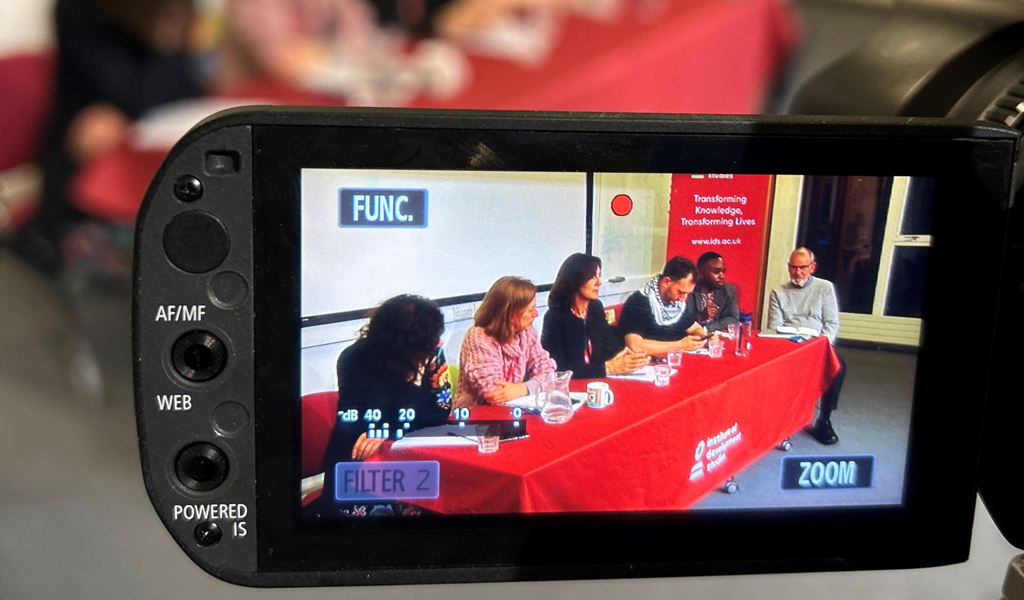
In its Recasting Development in 2024 event on 31 January, experts from IDS identified five crucial themes to focus on over the coming 12 months, offering insights into how development can be made more inclusive.
IDS has long argued for changes in development approaches, to challenge knowledge and power hierarchies that have pervaded development for decades. This involves, for example, going beyond simple divisions between the global North and the global South to recognise that some challenges are common to people across the world, even if experienced in very different way.
“What we’re calling for is a more transformative, egalitarian and inclusive knowledge and politics of development, relevant to all sectors across the world,” said Melissa Leach, IDS Director.
Watch the event now
Political participation
One of the big themes of 2024 is democracy, with around 25% of the world’s population heading to the election booth this year. Citizens in Bangladesh have already voted, with the incumbent re-elected after opposition parties boycotted the election. There is a clear trend of autocratic leaders becoming more popular in elections, and surprisingly, this change is being driven by young people.
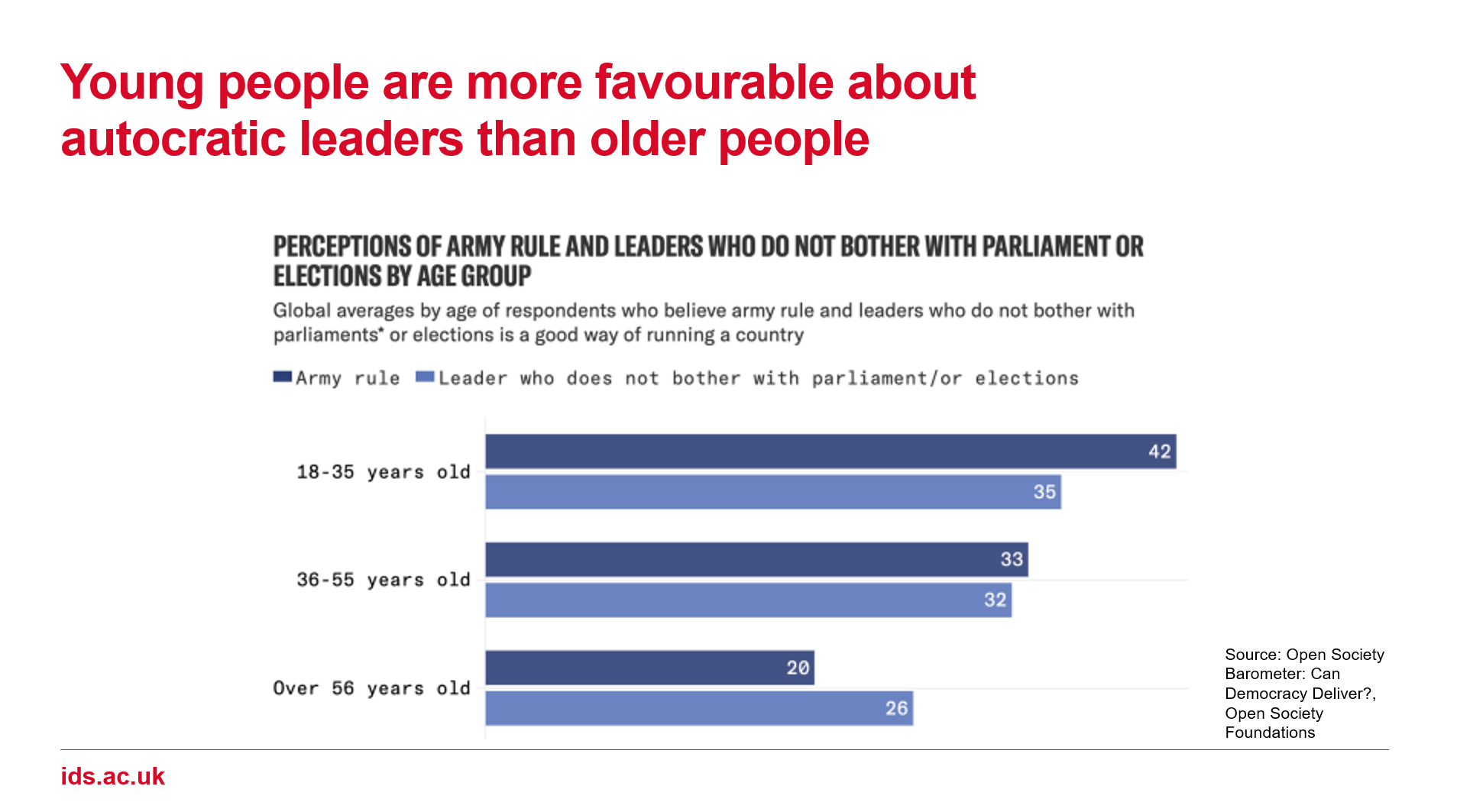
“We’ve entered a new era where elections might create a façade of democracy,” said Marjoke Oosterom, IDS Research Fellow. She highlighted in particular the risk that young people, disillusioned by corruption or because they don’t see any change, are turning away from democracy and embracing autocracy instead. Calls for a UN Special Rapporteur on Democracy, to investigate the state of democracy, are increasing in relevance, and donors need to up their game to support democratic actors.
But looking away from elections reveals a more positive picture of democracy. Young people after often expressing their views not through formal political processes but by more informal measures such as visual arts, music, or street protests – even in some of the most repressive environments. To understand democracy, Oosterom said, we need to look, “not just at election results, but all kinds of democratic activity.”
Economic democracy and food
Ideas around democracy spread beyond politics, however. In a world characterised by rising inequality, and increasing market concentration, Jodie Thorpe, IDS Research Fellow, highlighted the need for economic systems to be made more democratic.
Government responses to challenges such as the inequality caused by unregulated technological innovation can fall predictably along two lines – either encouraging more economic activity in the hope that benefits will trickle down to all citizens; or welfare provision to protect those vulnerable to change. But what governments are failing to do is create mechanisms which enable the citizens to have greater say in the economic decisions that affect them.
Food systems are one of the most obviously affected by this trend – for example, just four companies control 90% of the world’s grain trade. An examination of food initiatives during Covid-19, when traditional food systems were heavily disrupted, demonstrates how systems can be made democratic, through self-organising groups or initiatives which are more engaged with formal policy processes.
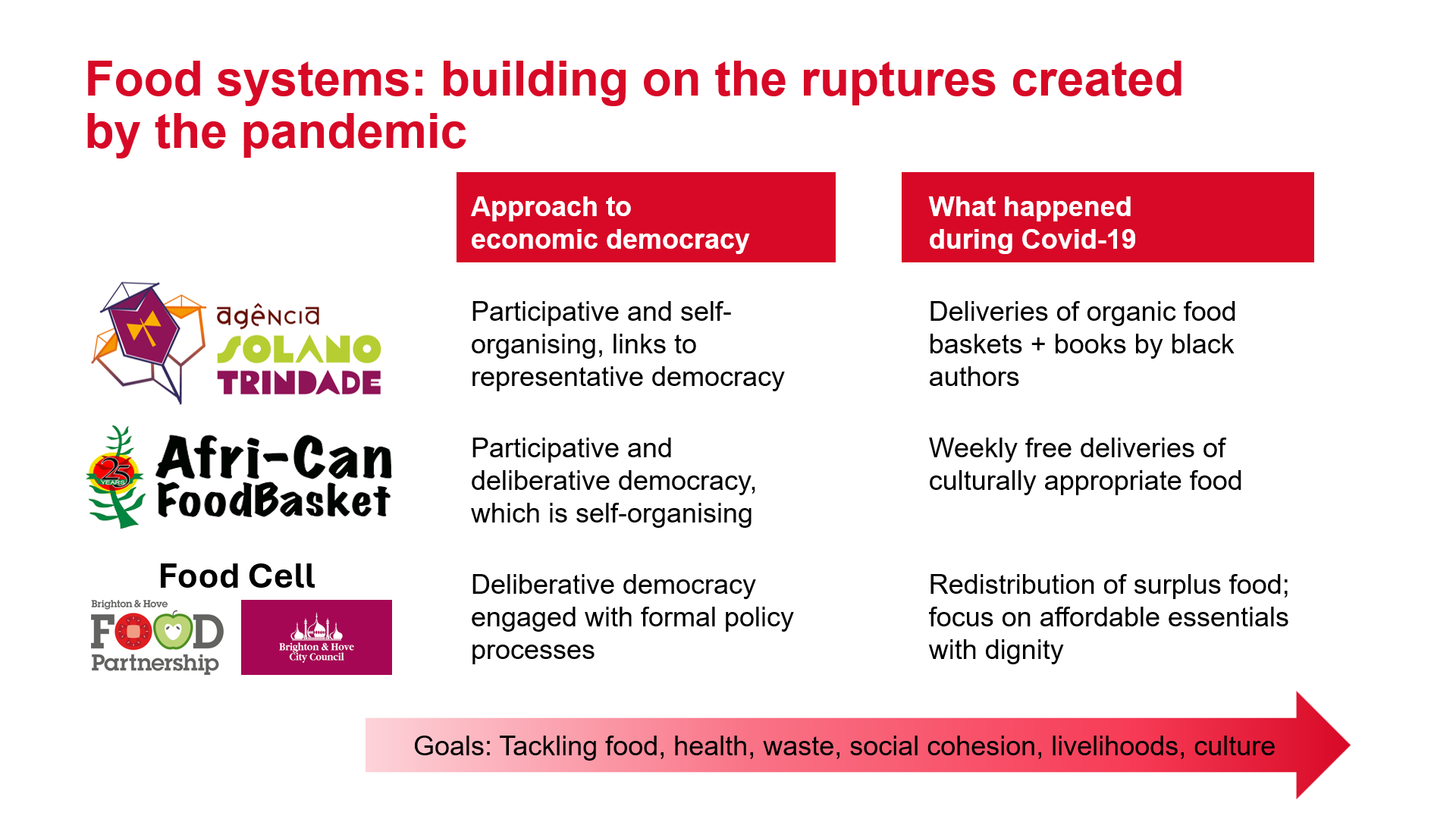
“What is the purpose of the economy?” Thorpe asked. “There is no doubt that the industrialised food system is really good at producing a lot of food, but we don’t only want food for calories.”
Humanitarianism
The desperate situation in Gaza and the increase in protracted crises are prompting urgent questions around the role of humanitarians in development. In Gaza, the humanitarian system has been denied access to those who urgently need it, and the UN Relief and Works Agency for Palestine Refugees in the Near East (UNRWA) has been unable to fulfil its mandate, with defunding from the US, UK and others the latest threat to its existence.
The challenges, according to IDS Research Fellow Philip Proudfoot, mean that humanitarians need to rethink their value of neutrality. “The traditional justification for humanitarians to distance themselves from politics is starting to fall into crisis,” he said.
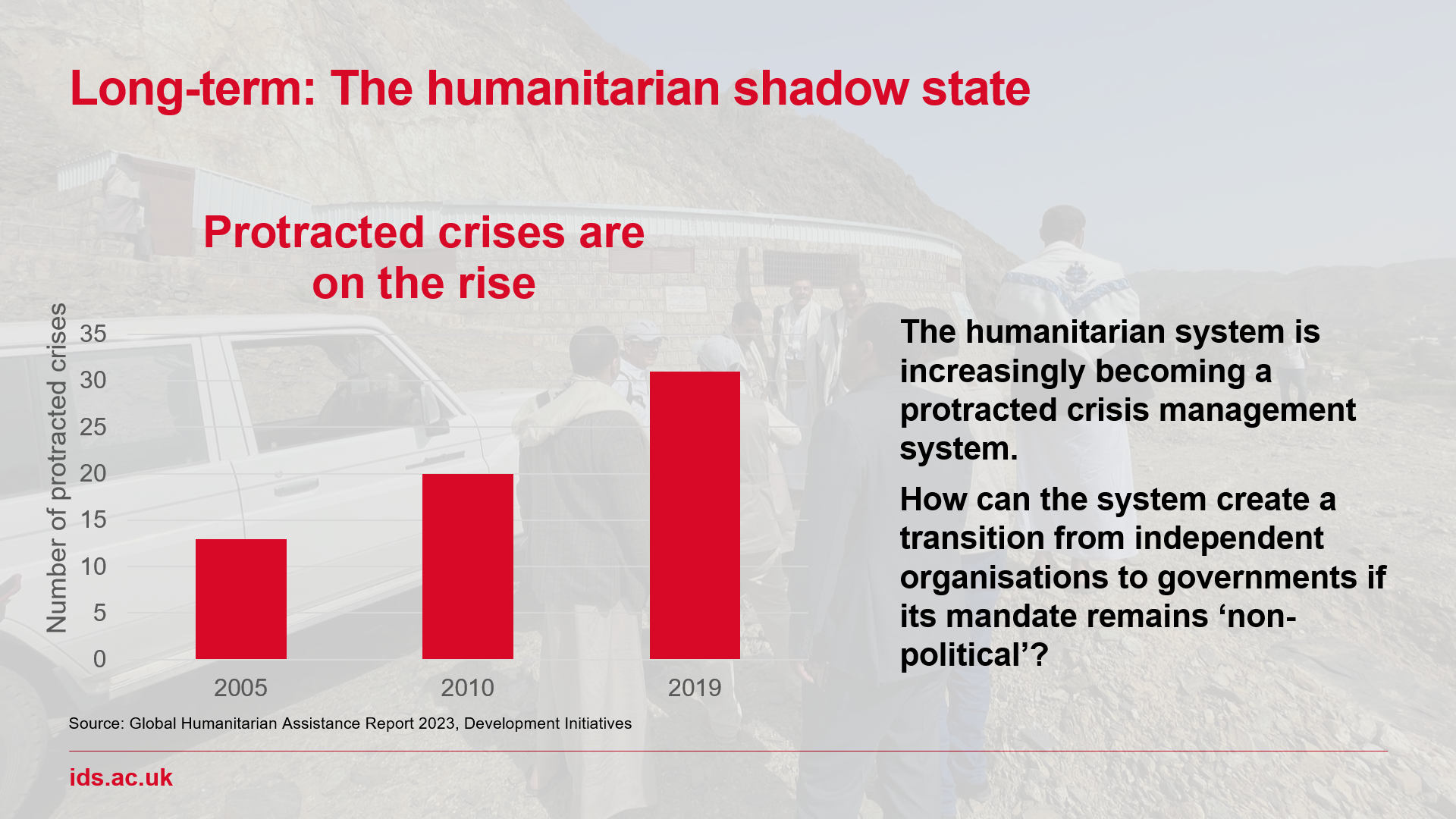
The increase in long-term crises, in countries such as Yemen, Afghanistan, DRC and Syria, is also raising questions about the neutrality of humanitarians. The traditional distinction between humanitarians – which ‘move things’ and development organisations, which ‘build things’, has become harder to maintain.
In protracted crises, where the goal of humanitarian agencies is to transition from independent organisations to governments, how can they do this if their mandate is non-political. “What is the humanitarian vision of the state?” Proudfoot asked. He argued that humanitarians should replace their commitment to neutrality with a commitment instead, to justice.
Financial systems
Global financial systems are also being put under strain, with over 50 countries either in debt distress or high risk of debt distress. Zambia was the first country to default during the Covid-19 pandemic with creditors including IMF, World Bank as well as private investors such as BlackRock. The ensuing budget deficits that the Zambian government is running has a direct impact on the amount of spending it has available for social programmes, undermining development in the country.
One of the drivers of these sovereign debt issues is inadequate taxation systems, with tax rates in many countries in the global South far below those rates in more developed economies. “You cannot address sustainable development without discussing taxation, because you can only spend what you make,” said Mbakiso Magwape, Postdoctoral Fellow at IDS.
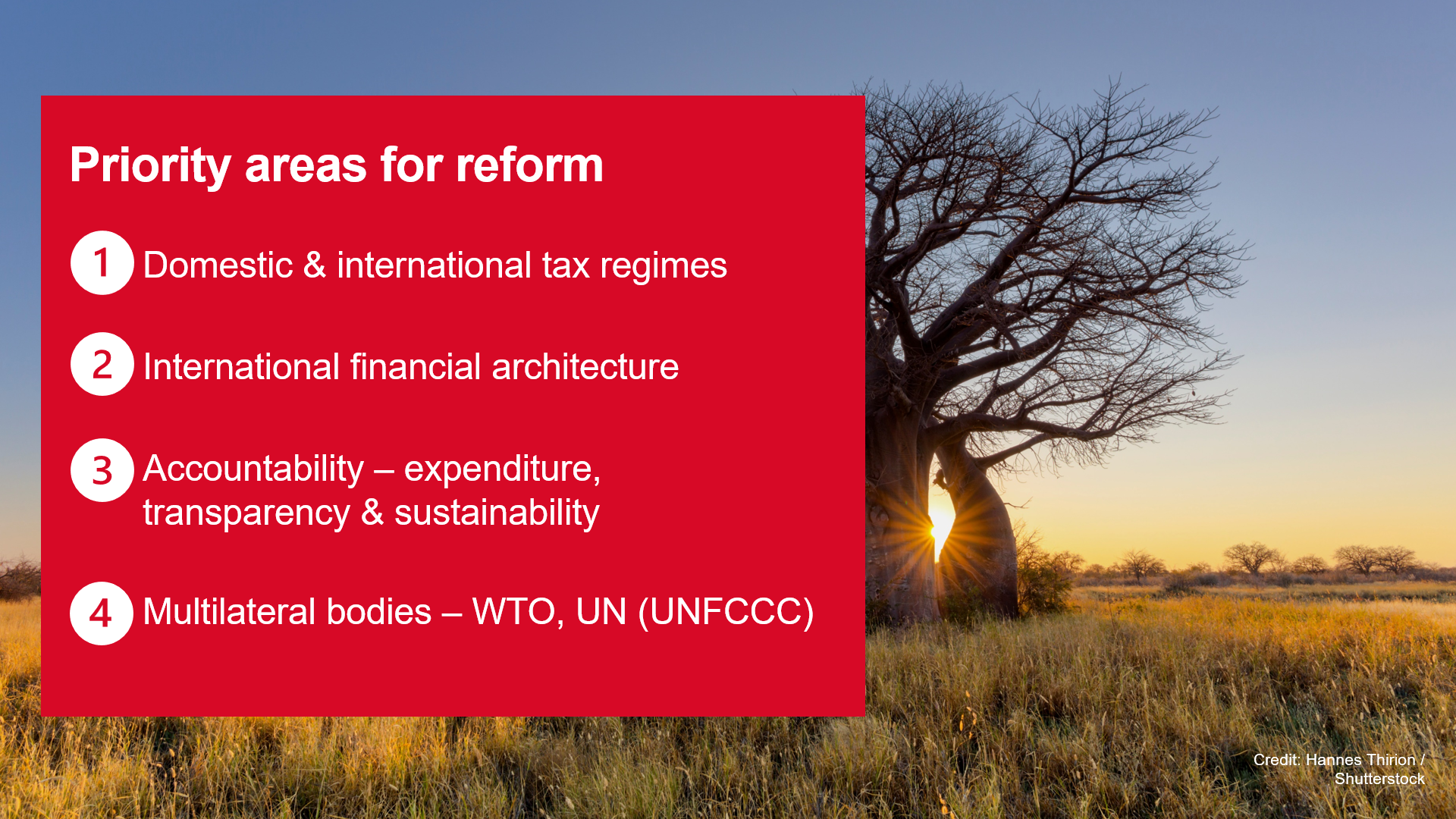
One priority is to look at taxation on large businesses, said Magwape. “Giving large multinationals incentives does not necessarily result in the location decisions of them coming to your country,” he said. “So, you’re giving incentives for nothing.”
Power and just transitions
As climate action becomes more urgent, so does the need to ensure that as the world transitions to a low-carbon economy, those already vulnerable to change are not further marginalised. When people talk of just transitions, whose justice are they referring to?
Study of communities affected by coal mine closures in the US Appalachians provides crucial insights into this question. As John Gaventa, Professor at IDS explained, the process of disinvestment in this region left behind hollowed out communities, leading to a growth in authoritarian politics and new forms of extraction.
As climate transitions speed up around the world, this pattern is starting to be felt in many other parts of the world. “As climate crisis and resource scarcity increases, I think we can also see with it rising forms of military and authoritarian power which seeks to protect vested interests,” said Gaventa.
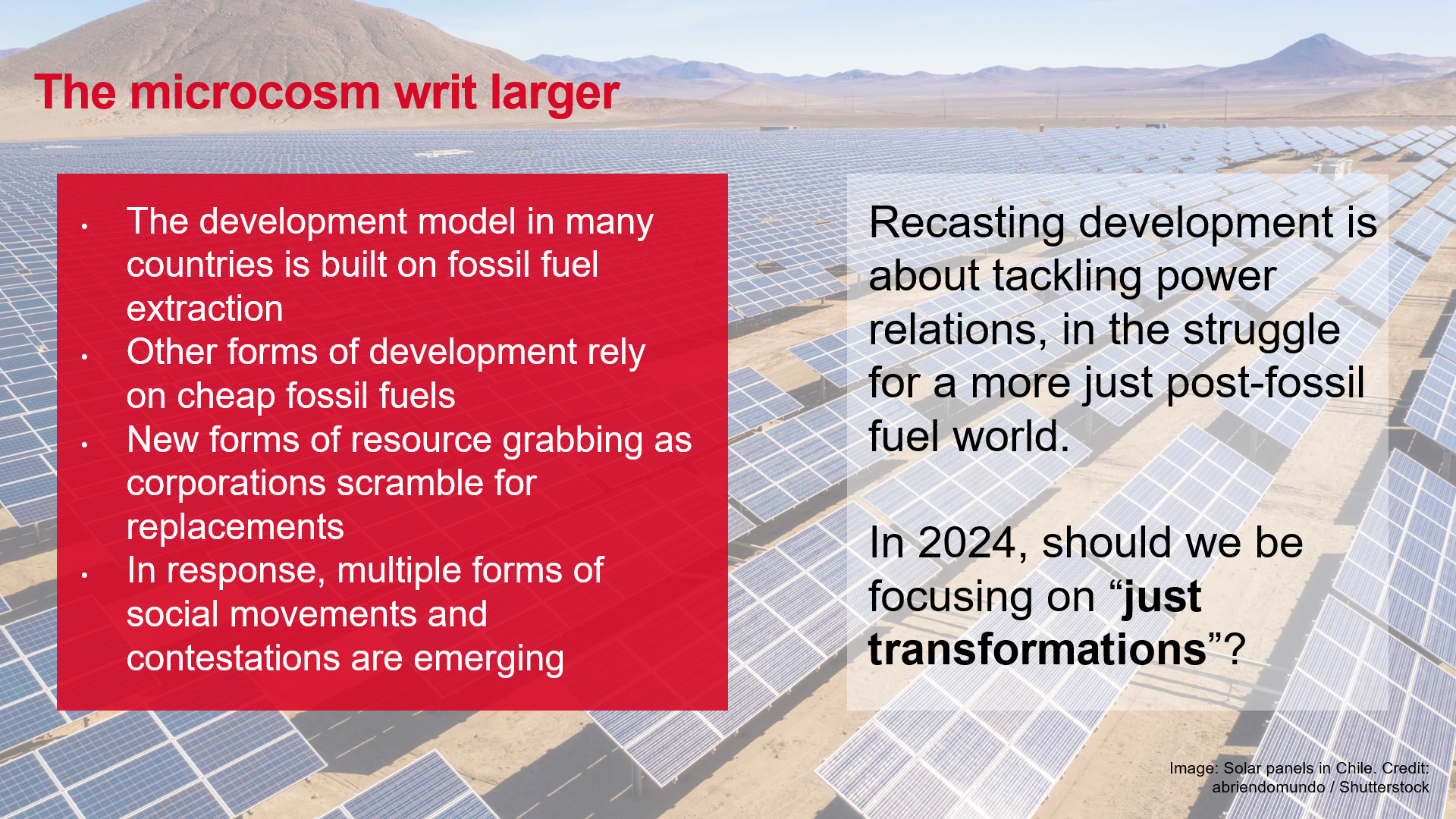
Recasting development in the 21st century, said Gaventa, “means envisaging a struggle towards a just transition that recasts not only our dependence on fossil fuels, but which reshapes power relations as well.”
These five themes – Political participation, economic democracy and food, humanitarianism, financial systems and power and just transitions – are crucial aspects which we need to address in 2024 if we are to have a chance of recasting development.
Download the full slides from the event.
To keep up to date with the latest IDS thinking, subscribe to our newsletter.